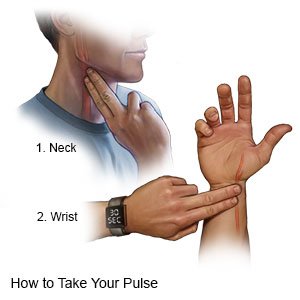Heart Block
Medically reviewed by Drugs.com. Last updated on Aug 4, 2025.
Heart block is a problem with the flow of electrical signals in your heart. The electrical signals control the way your heart beats. With heart block, these signals are delayed or interrupted completely. This affects the way your heart beats.
DISCHARGE INSTRUCTIONS:
Call your local emergency number (911 in the US) if:
You have any of the following signs of a heart attack:
- Squeezing, pressure, or pain in your chest
- You may also have any of the following:
- Discomfort or pain in your back, neck, jaw, stomach, or arm
- Shortness of breath
- Nausea or vomiting
- Lightheadedness or a sudden cold sweat
Call your doctor or cardiologist if:
- Your symptoms get worse or happen more often.
- You have questions or concerns about your condition or care.
Related medications
Medicines:
- Heart medicine helps your heart beat more regularly.
- Take your medicine as directed. Contact your healthcare provider if you think your medicine is not helping or if you have side effects. Tell your provider if you are allergic to any medicine. Keep a list of the medicines, vitamins, and herbs you take. Include the amounts, and when and why you take them. Bring the list or the pill bottles to follow-up visits. Carry your medicine list with you in case of an emergency.
Manage your symptoms:
Take your pulse regularly to check for any changes. Write down this information and take it with you to your visits with your healthcare provider.
 |
Follow up with your doctor or cardiologist as directed:
You may need to return for other tests or treatment. Write down your questions so you remember to ask them during your visits.
© Copyright Merative 2025 Information is for End User's use only and may not be sold, redistributed or otherwise used for commercial purposes.
The above information is an educational aid only. It is not intended as medical advice for individual conditions or treatments. Talk to your doctor, nurse or pharmacist before following any medical regimen to see if it is safe and effective for you.
Learn more about Heart Block
Treatment options
- Medications for Arrhythmia
- Medications for Heart Block
- Medications for Long QT Syndrome
- Medications for Preexcitation Syndrome
- Medications for Tachyarrhythmia
Care guides
Symptoms and treatments
Medicine.com guides (external)
Further information
Always consult your healthcare provider to ensure the information displayed on this page applies to your personal circumstances.
